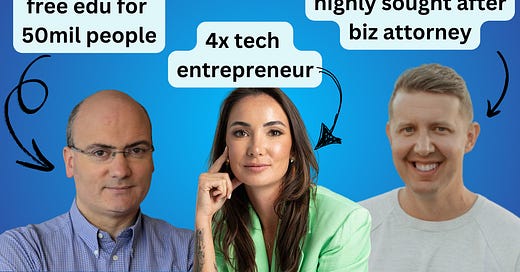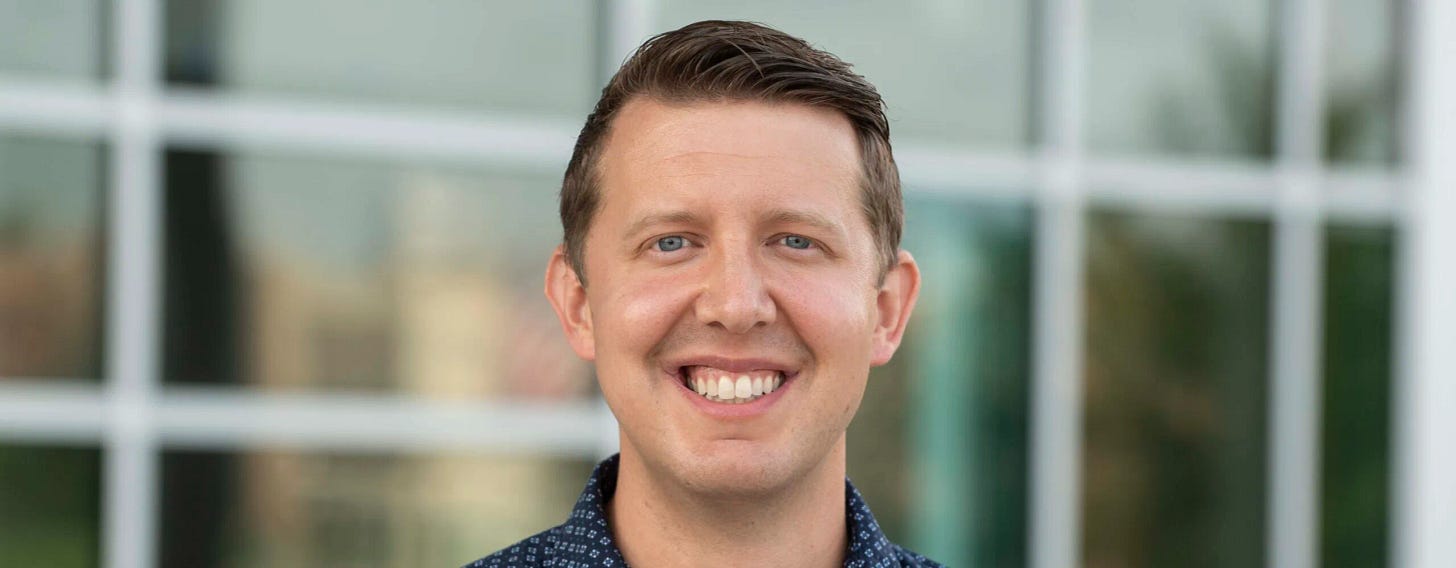Becoming Unf*ckwithable: PeopleTok's Legal Structure
A CEO who's provided 50mil people with free education, a DAO expert, and a top business attorney walk into a video chat. What did they say about making PeopleTok unf*ckwithable? DON'T MISS THIS!
In this post:
TL;DR: We’re taking on Big Tech, decentralizing governance, and making this a movement. This convo was a mix of legal chess, startup strategy, and a bit of sci-fi dreaming. Stay tuned for the next steps.
Roundtable 1.1: Incorporation & Legal Structure
Here’s the recording of our powerful, hour-long conversation:
Welcome to our first-ever roundtable—a deep dive into the nuts and bolts of how to keep PeopleTok (working title) unfuckwithable. We gathered brilliant minds to hash out the best way to structure and incorporate this platform so it stays true to its mission: transparent, democratic, and forever in the hands of the people.
We explored big questions like: Should we go the DAO route or stick with an LLC? Is the U.S. really the best place to incorporate, or is Ireland calling our name?
This is where the magic happens—where strategy meets creativity, and where we lay the groundwork for a platform built to outlast billionaires and bureaucracy. Let’s make this conversation count!
Meet the People
The best part of PeopleTalk/PeopleTok (whatever we decide to call it; branding is on the way) lies in its people. From the core team and supportive allies within the ecosystem to the larger community, it’s the people who make this project truly special.
It’s in the name—and even if the name evolves, the mission stays the same: to create the first truly people-first social media platform.
By the people, for the people, and with the people.
Matt Dearden
Matt Dearden is a highly sought-after business attorney with over a decade of experience delivering tailored legal services to businesses, high-net-worth individuals, and corporate clients.
As the founder of Dearden Law Offices, Matt’s expertise spans business transactions, tax consulting, contract negotiation, reputation management, and real estate law. His commitment to excellence and innovation has earned him a reputation as a trusted advisor to clients across industries.
Matt also leverages his engaging communication style on TikTok, where he breaks down complex legal concepts into easily digestible content for a broad audience. A graduate of the University of Cincinnati College of Law, where he honed his skills in startups and entrepreneurship, Matt has built a career on his ability to navigate intricate legal landscapes while prioritizing his clients’ goals. Beyond his legal practice, Matt actively contributes to his community through volunteer work, mentoring, and leadership roles.
Mike Feerick
Mike Feerick is the visionary founder and CEO of Alison, one of the world’s largest free online learning platforms, with over 50 million users worldwide. A Harvard MBA graduate and a leader in social entrepreneurship, Mike has dedicated his career to revolutionizing global education by making workplace-focused learning universally accessible.
He designed Alison to be self-sustaining and scalable, using an innovative model that combines free education with optional paid services. Mike believes that education is the foundation of social progress and sees Alison as a tool to address critical global issues like poverty, political instability, and climate change.
An Ashoka Fellow and sought-after speaker, Mike has received numerous accolades for his contributions to education and social entrepreneurship, including speaking at the Forbes CIO Summit. His vision aligns with the UN Declaration of Human Rights' call for free education, inspiring millions to empower themselves through knowledge.
Samantha Radocchia
Samantha Raddochia, aka Sam Rad, is a trailblazing futurist, anthropologist, and entrepreneur, celebrated for her groundbreaking work at the intersection of technology, culture, and human behavior. As the founder of Radical Next, a meta-media studio exploring transformative stories and innovations, Sam is shaping visions of a thriving, tech-enabled future.
With a background in anthropology, symbolic systems, and engineering, she applies her expertise to emerging fields like applied cryptography, blockchain, AI, immersive realities, and simulations.
A Forbes 30 Under 30 honoree, Sam holds several patents linking the physical and digital worlds and is recognized as a pioneer of NFT protocols. She has co-founded four companies, advised organizations like the United Nations and the World Economic Forum, and authored the bestselling book Bitcoin Pizza: The No Bullshit Guide to Blockchain.
Her latest book, RADICAL NEXT: Reclaiming Your Humanity in a Post-Human World hit #1 bestseller in all three of its categories on launch day.
Through her captivating talks across five continents, Sam inspires individuals and organizations to not only survive but thrive in times of radical change.
Takeaways & Next Steps
The Big Question: Where to Incorporate?
🇺🇸 The USA Argument:
✅ Access to funding
✅ Strongest business infrastructure
✅ Wyoming & Delaware have good protections for LLCs & DAOs
✅ Competing on home turf against Big Tech = legal protections
❌ BUT The US loves regulation & can be unpredictable
🍀 The Ireland Argument:
✅ Home of EU data infrastructure
✅ Lower corporate tax rates (15% vs. 21% in the US)
✅ Strong EU protections against government overreach
❌ BUT Still kinda under US influence (hello, Big Tech HQs in Dublin)
It’s also worth noting that DAOs are not formally recognized in Ireland, so if we go that direction we would have to create the LLC there and still create the DAO in the US.
🌍 The Decentralized Approach?
Sam made the wild (but interesting) point: Why have an entity at all? What if everything is structured as DAOs and tokens with no single legal jurisdiction? 🚀 Big brain move, but tricky in a world where we still need bank accounts and contracts.
So we likely need an entity…at least getting started.
🔥 Legal & Structural Takeaways
LLC vs. B Corp vs. Nonprofit
LLC (Limited Liability Company): Offers maximum flexibility and liability protection. This structure allows for operational freedom and the ability to scale, while safeguarding personal assets from business liabilities.
B Corp (Benefit Corporation): Focuses on balancing social impact with financial profit. While a B Corp requires a legal commitment to social and environmental goals, an LLC can include similar social impact provisions in its operating agreement, making the additional benefits of a B Corp relatively minimal for companies with a strong mission focus.
Nonprofit: Heavily regulated, which could limit operational agility and make it more challenging to compete with larger tech companies. The stringent oversight and government involvement can hinder flexibility, especially in terms of business strategy and profit distribution.
🏆 Winner? Probably an LLC + a Wyoming-based DAO for governance to keep things decentralized but still legally protected.
💰 The Road to Revenue
We don’t want VC money because VCs = strings attached & corporate hijacking (RIP cool projects that sold their souls).
Instead, we’re going full grassroots crowdfunding—but without offering equity. Because this needs to be more of a public utility than a for-profit asset for it to be what it needs to be in the world.
After crowdfunding, we’ll need to get the platform to a place of generating revenue as quickly as possible so that it can be self-sustaining.
🔹 Crowdfunding = ✅ legal
🔹 Equity crowdfunding = ❌ potential securities law nightmare, takes us away from the mission of being user-owned/governed and unfuckwithable.
🔹 Revenue streams? Platform interactions, creator transactions, subscriptions, maybe ethical ads (consent-based).
📜 Other Juicy Insights
Data & Infrastructure – We might need separate entities for different regions due to GDPR & data localization laws.
Governance Concerns – Who watches the watchers? Even with smart contracts, there has to be some form of oversight.
"Social Business" Model – Inspired by Mike’s Alison model, where revenue covers costs, scales impact, and isn’t driven by hyper-profit motives.
🎯 Where We Landed
Structure: Likely LLC + Wyoming DAO for governance
Funding: Grassroots crowdfunding, user-driven (not equity-based)
Global Expansion: Plan for multi-region compliance
Next Steps: Flesh out exact governance models, finalize incorporation plans, and start rallying the people
What do you think? Should we incorporate in the USA, Ireland, or somewhere else? The team is leaning toward what is home turf for most of us.







If I can add a consideration to the table. New Zealand is a good place to set up a business. Its been ranked as the top or among the top easiest places to set a business up. The legal system is well protected, the country is very stable and resistant to foreign influence on policy.
I would personally be concerned with the ability of a state level legal system to protect an organisation like this from the US government if they took a dislike to it.
Just my thoughts anyway.
Switzerland has probably the most stable political and legal system. And is known for its global neutrality.
FIFA, UEFA, Olympics and many more are registered as associations in Switzerland and pay no taxes.
Feel free to let me know if I can be of any help moving things forward in Switzerland.